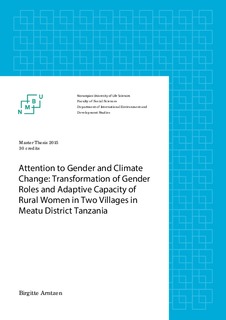| dc.description.abstract | The study of transformation of gender roles and adaptive capacity in the context of climate change took place in the two villages in the Meatu district in Tanzania; Mwamanimba and Mwashata. Impacts of climate variability and change, like drought, inconsistent rainfall patterns, less reliable and shorter rain seasons, result in households having less access to water, decreased agricultural production and reduced access to food. This lead to additional pressure on already vulnerable households. Relations, structure and agency contribute to the transformation of gender roles and determine people's adaptation strategies. The main findings are firstly, that the impacts of climate change, such as increased drought contribute to a change in household structures that has consequence for gender relations due to the slow process of the decrease of polygamous household structures.
Secondly, results identify a transformation of gender roles due to women’s triple role and the heavy burden of increased responsibilities. With respect to climate change, the triple role of women is particularly a threat to women’s adaptive capacity and empowerment as the triple role increases household tasks, farm duties and community labor for women. Furthermore, a huge number of husbands escape the villages during drought and hunger crisis, and wives are left behind taking care of their children and the elderly. This is an event which threatens the women and the development of the village.
The role of men are also changing, especially for the men in polygamous household structures due to the household structure's decrease. Some men have started to fetch water, and since year 2000 some men have started to assist their wives with food preparations, which is clearly women’s responsibilities according to traditional gender roles. This is an influence from climate change and from migrants from other areas outside Mwamanimba and Mwashata.
Moreover, the results present strong differences between the variables ‘household structure’ and ‘income level’. Respondents from low level of income and those with no livestock are the most vulnerable to the impacts of climate change. In contrast, the households with high amount of livestock have greater access to resources and therefore are able to adapt to the impacts of climate change. The representation of female headed households is slight but members tend to have less access to resources due to a low level of income. | nb_NO |

